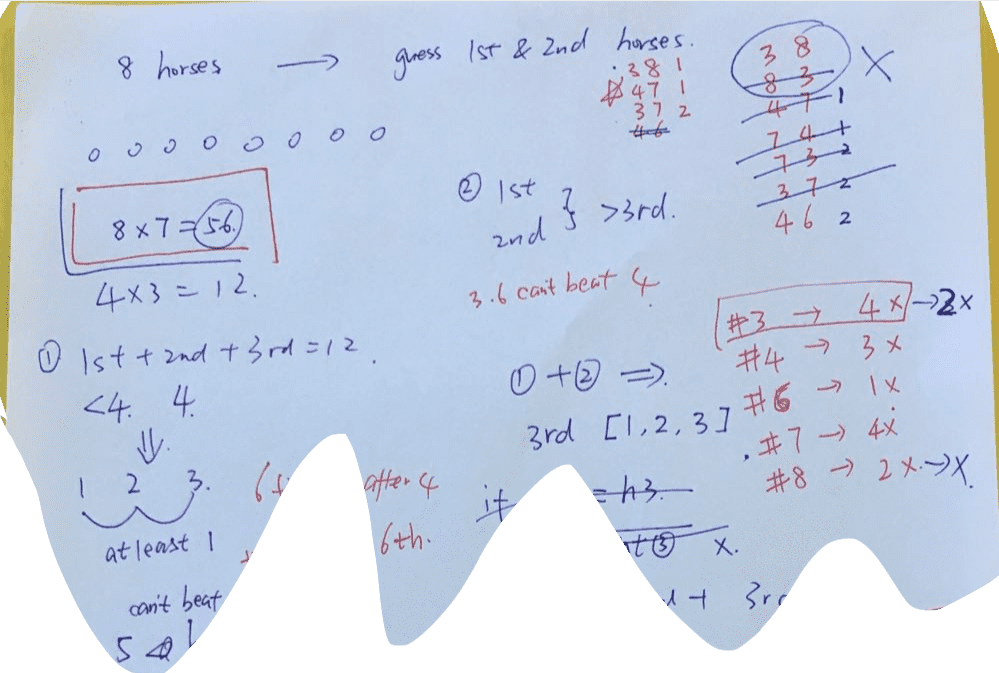What 'The Genius' Teaches Us About Human Behavior
'The Genius' is a Korean game show that pits 12 individuals against eachother in a battle of wits and political skill. I just discovered the show yesterday after watching a great video from youtube user "Just Write". After watching a few episodes, I have to agree with the video on almost all of the points: the show has style, the editing is charmingly good, the focus on interpersonal relationships is hella' engaging, and the music is top notch. Plus, episode 5 had me and my girlfriend making notes like this:

The situation in episode five was this: two losing players faced off against eachother in a death match game. Each "death-matcher" had to play rock/paper/scissors exactly once with every other player in a stream of games. The object of the death match game was to have the longest r/p/s. win streak. I want to talk about some of the behaviors I noticed throughout this death match game and how they can help explain 3 human behaviors more generally: humans are selfish, humans remember feelings more than actions, and ultimately humans forgive.
Humans Are Selfish
Because the object of the game was to have the longest r/p/s win streak against the non-losing players, the non-losing players had complete power. After all, they could choose to win or lose when it came to their turn. No doubt, some players took advantage of this. Especially one player in particular, Poong. He had all the leverage; he was in complete control.
"I'll help you for some garnets", he said (garnets are in-game currency). He had lied to one of the death-matchers by saying he recieved an offer from the opposing death-matcher. "She's offering me a garnet to beat you in the death match. What do you say to that?" Inevitably, each death-matcher had offered a higher and higher price to survive against Poong. In the end, Poong was getting 3 garnets regardless of the outcome of the death match! He had taken complete advantage of the two death-matchers in their weakest moment.
This stood out to me. How could someone like Poong act so selfishly? What about decency, chivalry, integrity? Do those hold no weight in Poong's life? Then I remembered. I remembered the times I had been burnt by someone taking advantage. I remembered that when life gets really tough, humans look out for themselves first. When opportunity rears its head, a human is always there to pounce on it. Humans are innately selfish as their biology requires them to be. Were it not for this quality, humans would have died to save the countless now-extinct species that used to once roam the planet. If you keep this in mind, it's much easier to forgive and empathize with the humans in your life who you percieve to be selfish.
Humans Remember Emotions Over Everything Else
During the death match, a twist was revealed: all the previously eliminated players from the past episodes returned and joined in the r/p/s games. This introduced a new element: the death-matchers had to face every person they had ever betrayed, backstabbed or eliminated in the past. This brings up behavior #2: humans remember emotion over everything else.
Emotions were the basic set of tools that humans used for thousands of years. They used emotion as a guide to survival. Fear, sadness, loneliness, happiness, and uncertainty were the walls and pathways of a metaphorical maze to safety. It's for this reason that your longest-lasting memories are so tightly linked to a strong emotion. Humans evolved to remember these emotions for survival.
One of the death-matchers faced off against her old ally; one whom she'd betrayed and eliminated 5 episodes earlier. The emotion in the room was high. It was heightened even more by the exclamation points edited in during the face-off (gotta love korean editing). Despite the pleas for mercy, and despite the fact that this betrayal happened 5 weeks ago, the eliminated player couldn't help but feel vengeful. She purposely beat the death-matcher, thereby ending the win streak.
Take this advice into consideration next time you act: think about the other person's feelings. No matter what you did, they will ultimately remember the feeling, not the action.
Ultimately, Humans Forgive
Despite these highly emotional face-offs, forgiveness was the lasting theme of the episode. Despite the issues that brewed between many of the players, the eliminated players mostly chose forgiveness. They purposely lost so that the win streak could continue. It was these moment that I enjoyed watching the most.
The capacity for humans to forgive is strong; stronger than anything else. Forgiveness is a form of acceptance and love. Deep down, humans crave to be forgiven for their mistakes. If you remember anything from this post, remember that. And remember to not only give for forgiveness, but to ask for it as well. It's a two-way street.
Conclusion
Humans are fussy, imperfect creatures. They can be selfish at times (a lot of times), and they can be emotional and illogical. But if you can look past those qualities and learn to forgive, humans will surprise you in ways that no other creature can.
I don't usually enjoy reality television, but I'm glad I gave this show a shot. Of course, the show could all be scripted, in which case I applaud the writers. A seemingly simple game like rock/paper/scissors can turn out to reveal a few good lessons about human behavior. I'll be interested to see what more 'The Genius' has in store. You can watch the show here